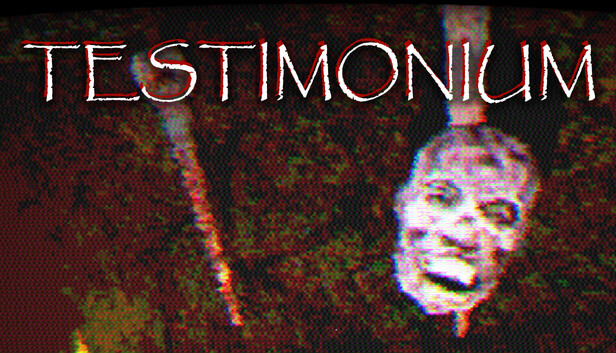Testimonium is a short, experimental analog psychological horror game developed by indie creator Andrii Sotnyk and published by NECRONOMISOFT. Described as a “bite-sized experience designed to push your psychological limits,” the game begins with a simple yet chilling setup: you receive a mysterious package containing a VHS tape marked with a burned-in symbol. The moment you interact with it; you awaken inside the tape itself trapped in a surreal and blood-soaked environment of rusted iron and ritualistic imagery.
The entire experience lasts around fifteen minutes, it does not follow the traditional Survival Horror mechanics in the “OG Psychological games” but it offers a linear narrative with no save system and minimal replay value. But within that brief runtime, Testimonium manages to make a striking impression.


What immediately stands out is its atmosphere and visual style. The game embraces a nostalgic PS1 and VHS aesthetic gritty textures, analog distortion, and a grimy, decayed color palette that instantly evokes the unease of old found-footage tapes. The low-resolution visuals are not a limitation here; they’re a deliberate choice that deepens the immersion, creating a dirty and claustrophobic sense of dread.
Narratively, Testimonium excels through its simplicity. The concept of being “trapped inside a tape” is haunting in itself, suggesting a cycle of observation, punishment, and repetition. The environment is littered with symbolic details ritualistic markings, eerie props, and ambient sounds that tell fragments of a story without ever spelling it out. It’s a world that feels like it exists to be explored, not solved, and that mystery is what gives it staying power even after the credits roll.
The gameplay itself is minimal but purposeful. There are light puzzles and exploration elements that blend seamlessly with environmental storytelling. Every small action feels deliberate, contributing to the game’s tension and pacing. The sense of progression isn’t measured by achievement but by emotional reaction curiosity, discomfort, and a growing feeling of unease.


However, Testimonium is not without its drawbacks. Its brevity means that players seeking a longer, more elaborate horror experience may find it too short-lived. There’s little in the way of narrative depth or character development, and once completed, there’s not much incentive to replay beyond appreciating the craft. The experience feels more like an art piece or psychological experiment than a traditional game which may limit its appeal to a niche audience.
Despite these limitations, the game succeeds brilliantly at what it sets out to do: create a compact yet deeply unsettling analog horror experience. It’s a spiritual cousin to the wave of PSX-style horror titles that have recently re-emerged, focusing more on emotion and atmosphere than conventional scares or combat. Rather than trying to terrify with jump scares, it unsettles through tone, pacing, and ambiguity.


In the broader horror landscape, Testimonium represents a return to horror’s experimental roots a reminder that fear doesn’t always need scope or spectacle. It’s a quiet, personal nightmare that lingers long after you’ve left its world.
Verdict:
Testimonium is a haunting, short-form horror experience that proves sometimes less is more. It’s not a game meant to entertain in the traditional sense it’s meant to disturb, to make you think, and to leave you uneasy in your own silence.
Best for: Players who appreciate atmosphere over action, short experimental horror, and the analog aesthetic that blends surrealism with psychological unease.
Not for: Those looking for lengthy campaigns, deep character arcs, or heavy gameplay mechanics.
In short, Testimonium isn’t about survival it’s about surrendering to the dread of being seen, recorded, and remembered by something far older and darker than the lens of a camera.
Get it on: Save 10% on Testimonium on Steam
Trailer:

